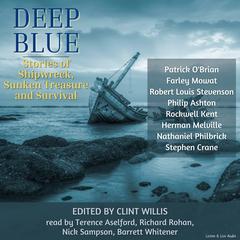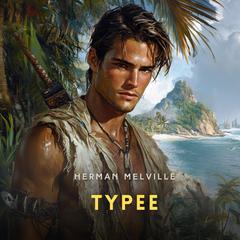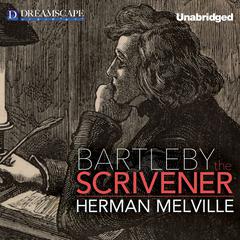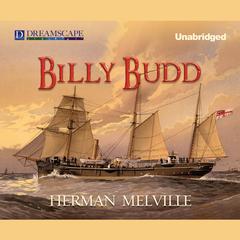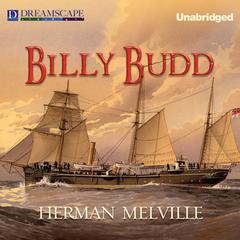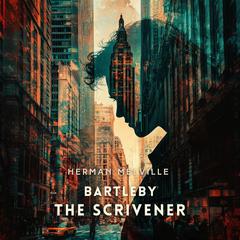 Play Audiobook Sample
Play Audiobook Sample
An Audio Bundle: Storm & Deep Blue: Stories of Survival from Land, Sea, and Sky Audiobook
 Play Audiobook Sample
Play Audiobook Sample
Quick Stats About this Audiobook
Total Audiobook Chapters:
Longest Chapter Length:
Shortest Chapter Length:
Average Chapter Length:
Audiobooks by this Author:
Publisher Description
Most people associate storms and other big weather with death—with the kind of force that makes each of us wonder about life, and time and the nature of our surroundings. Some people go out looking for bad weather or go to places where they’re likely to encounter it. Others have the misfortune of being at the wrong place at the wrong time. Still, the stories in Storm have more to say than that. They tell us about what happens when people find that treacherous weather—or when it finds them—and we are reminded of the fragility of life, the capriciousness of Nature’s will, and how little we can do when both cross paths. In Deep Blue, for those who dare, things often go wrong under the sea. Such tragedies, spurred by the booming interest in the Titanic and the Andrea Doria, have been the focus of tremendous literature form the world's finest authors. Deep Blue offers compelling tales of shipwrecks and salvage, submarine adventure and free diving, nautical survival and cannibalism.
Download and start listening now!
An Audio Bundle: Storm & Deep Blue Listener Reviews
Be the first to write a review about this audiobook!
About the Authors
Herman Melville (1819–1891) was born in New York City. Family hardships forced him to leave school for various occupations, including shipping as a cabin boy to Liverpool in 1839—a voyage that sparked his love for the sea. A shrewd social critic and philosopher in his fiction, he is considered an outstanding writer of the sea and a great stylist who mastered both realistic narrative and a rich, rhythmical prose. He is best known for his novel Moby-Dick and the posthumously published novella Billy Budd.
John Vaillant is the author of acclaimed, award-winning nonfiction books, including the bestsellers The Golden Spruce and The Tiger. Fire Weather was a finalist for the 2024 Pulitzer Prize. His debut novel, The Jaguar’s Children, was a finalist for the Rogers Writers’ Trust Fiction Prize and the International Dublin Literary Award. His many awards include the Governor General’s Literary Award and the Pearson Writers’ Trust Prize for Nonfiction, among others.
Jack London (1876–1916) was an American author, journalist, and social activist. Before making a living at his writing, he spent time as an oyster pirate, a sailor, a cannery worker, a gold miner, and a journalist. He was a pioneer in the then-burgeoning world of commercial magazine fiction and was one of the first fiction writers to obtain worldwide celebrity and a large fortune from his fiction writing. He is best known for his novels The Call of the Wild and White Fang, both set during the Klondike gold rush, as well as the short stories “To Build a Fire,” “An Odyssey of the North,” and “Love of Life.” He also wrote of the South Pacific in such stories as “The Pearls of Parlay” and “The Heathen.” He was a passionate advocate of unionization, socialism, and the rights of workers and wrote several powerful works dealing with these topics, including The Iron Heel, The People of the Abyss, and The War of the Classes.
Nathaniel Philbrick is the National Book Award–winning author of In the Heart of the Sea, Revenge of the Whale, Sea of Glory, and others. Philbrick has won numerous awards for his work, including the Massachusetts Book Award, the Albion-Monroe Award, and the New England Book Award; his book Mayflower was nominated for the Pulitzer Prize in 2007. His book The Last Stand was named an ALA Notable Book and was the basis for a two-hour PBS American Experience film called Custer’s Last Stand. A graduate of Duke and Brown Universities, he currently lives in New England.
Stephen Crane (1871–1900) was an American novelist, poet, and journalist. He worked as a reporter of slum life in New York and a highly paid war correspondent for newspaper tycoons William Randolph Hearst and Joseph Pulitzer. He wrote many works of fiction, poems, and accounts of war, all well received but none as acclaimed as his 1895 Civil War novel, The Red Badge of Courage. Today he is considered one of the most innovative American writers of the 1890s and one of the founders of literary realism.
Sebastian Junger is the New York Times bestselling author of several books. Together with Tim Hetherington, he directed the documentary Restrepo, which won the Grand Jury Prize at the Sundance Film Festival. He is a contributing editor to Vanity Fair and has been awarded a National Magazine Award and an SAIS Novartis Prize for journalism.
Robert Louis Stevenson (1850–1894) was born in Scotland. He studied engineering and law at the University of Edinburgh and then began writing while traveling in France. The publication of Treasure Island in 1883 brought him fame and entered him on a course of romantic fiction beloved by young and old alike.
John Muir (1838–1914), Scottish-born American naturalist, was one of the most influential conservationists and nature writers in American history. Founder of the Sierra Club and its president until his death, he was instrumental in helping to save wilderness areas, including Yosemite Valley and Sequoia National Park. He was a spirit so free that all he did to prepare for an expedition was to “throw some tea and bread into an old sack and jump the back fence.”
Philip Ashton, a man from Massachusetts, survived as a castaway on an island for sixteen months before being rescued by a ship from New England.
Rick Bass is an American author of numerous award-winning works of fiction and nonfiction. His memoir Why I Came West was a finalist for the National Book Critics Circle Award. His short fiction, which has appeared in the New Yorker, the Atlantic, Esquire, and the Paris Review, as well as numerous times in Best American Short Stories, has earned him multiple O. Henry Awards and Pushcart Prizes as well as NEA and Guggenheim fellowships. He was born and raised in Texas, worked as a petroleum geologist in Mississippi, and has lived in Montana’s Yaak Valley for almost three decades.
Sebastian Junger is the New York Times bestselling author of several books. Together with Tim Hetherington, he directed the documentary Restrepo, which won the Grand Jury Prize at the Sundance Film Festival. He is a contributing editor to Vanity Fair and has been awarded a National Magazine Award and an SAIS Novartis Prize for journalism.
Herman Melville (1819–1891) was born in New York City. Family hardships forced him to leave school for various occupations, including shipping as a cabin boy to Liverpool in 1839—a voyage that sparked his love for the sea. A shrewd social critic and philosopher in his fiction, he is considered an outstanding writer of the sea and a great stylist who mastered both realistic narrative and a rich, rhythmical prose. He is best known for his novel Moby-Dick and the posthumously published novella Billy Budd.
Farley Mowat is a Canadian author and environmentalist. His works have been translated into fifty-two languages and he has sold more than seventeen million books. He achieved fame with the publication of his books on the Canadian North, such as People of the Deer and Never Cry Wolf. The latter, an account of his experiences with wolves in the Arctic, was made into a film, and was released in 1983.
Xe Sands has more than a decade of experience bringing stories to life through narration, performance, and visual art, including recordings of the Nightwalkers series from Jaquelyn Frank. She has received several honors, including AudioFile Earphones Awards and a coveted Audie Award, and she was named Favorite Debut Romance Narrator of 2011 in the Romance Audiobooks poll.
About the Narrators
Barrett Whitener has been narrating audiobooks since 1992. His recordings have won several awards, including the prestigious Audie Award and numerous Earphones Awards. AudioFile magazine has named him one of the Best Voices of the Century.
Richard Rohan is a stage, film, and voice-over actor who has narrated hundreds of audiobooks over the last decade, in every genre. He is particularly proud of his work as director and performer on the acclaimed Space Fantasy audio drama series Deathstalker.







